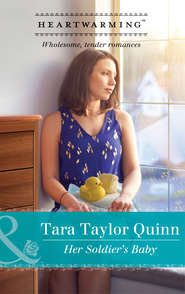По всем вопросам обращайтесь на: info@litportal.ru
(©) 2003-2024.
✖
Sophie's Secret
Автор
Год написания книги
2019
Настройки чтения
Размер шрифта
Высота строк
Поля
But she recognized the tone as though she was still that twenty-year-old undergrad at Montford University in Shelter Valley, Arizona, rather than the twenty-eight-year-old successful theatrical producer she’d become.
Like that twenty-year-old she’d once been, she opened the door. And couldn’t meet her friend’s eyes.
How many times, during those years of doing shows together—Annie as a dance major and Sophie majoring in theater production—had she had to face her friend on the other side of a stall door?
“Oh, Soph. You said you were done with all that. That it had been years—”
She glanced up. “It has been.”
“Show me your finger.”
Sophie’s long nails were legendary, though they were shorter now than they had been in college, and the bold colors they used to be adorned with had toned down to pale pinks. She held out her right palm—middle finger extended straight up.
“It’s not broken off.” For years the nail of that finger had been a short stub necessitated by Sophie’s addiction to sticking it down her throat. Tonight, it was even with the rest—an eighth of an inch beyond her fingertip.
“I know.”
“So…”
“I didn’t consciously do it,” Sophie said, fighting panic—and myriad other emotions that were what got her into trouble in the first place. And every place after that, as well.
If she could keep the different parts of herself neatly packed away in their respective compartments, she’d be fine. It was only when the emotions took over, spilled over, that she had problems.
They hadn’t spilled over in years.
“I…really…I didn’t know what was happening.” At least not that she’d been able to acknowledge to herself.
She wanted to go home.
To lock herself inside her two-bedroom stucco abode on her acre of desert and sleep until she was better.
Frowning, Annie grabbed Sophie’s still-extended finger, holding on. “So you didn’t do it to yourself? You have the flu?”
One shouldn’t sound quite so happy at the possibility that one’s friend was sick.
Sophie couldn’t answer.
“Soph?”
“It didn’t feel like the flu,” she finally admitted.
“You were able to control it,” Annie said, knowing the signs, having gone through all the symptoms with Sophie the first time. “Your thoughts made it happen.”
When she’d been distracted with the show, the nausea had gone away. Did that count?
Sophie could have said the words aloud, but she knew the answer. Yes, it counted.
“I brought it on myself.”
Which was ridiculous. Most particularly here—at a show. Here she was a successful, confident woman. Period.
With Phyllis, her Shelter Valley friend and onetime counselor, Sophie could let the little girl inside come to the surface. Maybe. If she had to.
“Ah, Soph, I thought things were great. These past two weeks, working on the show, you’ve seemed so happy. Why didn’t you say something? We could have taken time away, really talked.”
Why hadn’t she said something? Why hadn’t she told her friend the whole truth? Why hadn’t she told Annie—someone who’d known her before, who would understand—that she was struggling? Why hadn’t she admitted, even silently, that she’d allowed herself to return to a place she’d vowed never to revisit?
Bulimia-ville.
“I didn’t know.” Sophie answered her own last question first. “I swear, Annie, this is the first time. And it really wasn’t a conscious choice. I just…I guess old habits really do die hard. Or don’t ever die. They just lie there, waiting to attack you when you’re at a weak point.”
“You know the signs, Soph. The symptoms.”
Nodding, Sophie thought over the past few months. The past two years. When her sexual being had come back to life.
She thought of Duane. And quickly shut that mental door.
“I didn’t see it coming,” she said. “I’m older. Successful. I have many reasons to feel good about myself. I really thought I wasn’t susceptible anymore.”
Another dancer, a guest performer in the evening’s closing performance, pushed through the door from the dressing room, said, “Sorry, I gotta pee,” then, with a smile in their direction, dashed into a stall.
“Let’s go find a place to get something to eat,” Annie said, pulling Sophie in the direction of the door.
“You’ve got a cast party to get to.” She’d been here two weeks and had managed to avoid any one-on-one personal conversation with the woman who’d once been such a close confidant. “And I really should hang around while they tear things down.”
“The local techies are going to get all of that.” Annie pointed out what they both knew. “And you’ve got time to finish up paperwork in the morning before your flight back to Phoenix.”
Sophie allowed herself to be pulled into the bustle of a quickly emptying dressing room. “But your party—”
“Is nothing compared to you,” Annie said softly. She approached her seat at the long, lighted dressing table, throwing things in her bag with an unusual disregard to orderliness. “It’s not like I haven’t performed with these people before, or like I won’t again.”
Sophie went to collect her things.
LIFTING HIS GLASS, Duane peered at the small, select group of men and women gathered in the living room of his Phoenix high-rise condo. The party was unofficial. A Saturday-night get-together of friends.
The friends just happened to be the most powerful political movers and shakers in the state of Arizona.
“You’re the one, buddy,” Robert Anvil said, touching his glass to Duane’s as the rest of the small group nodded.
Looking to Will Parsons, the one man in the room he truly trusted, one of the few people in the world he considered a friend, Duane waited. And only drank when he received Will’s quiet nod.
Any other evening he and Will got together it was at Will’s home in Shelter Valley, a small town an hour’s drive from Phoenix. Shelter Valley had been home to Will Parsons all his life, and a regular stopping place for Duane the past two years.
The two men had met in college—at Montford University, the Harvard of the West. Will was now president of the renowned educational institution. His wife, Becca, standing next to him tonight, was mayor of Shelter Valley.
Neither of those facts was the reason Duane considered them friends.
Toast completed, talk broke out among the twenty people who’d come together to informally offer Duane their party’s nomination for the senate seat in Arizona’s state election the following fall.











